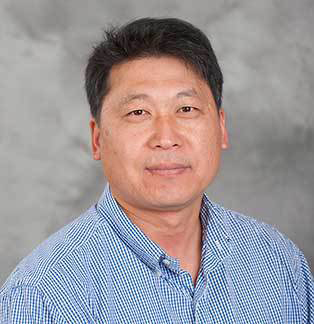WSSU awarded $2.26 million grant from the U.S. Department of Energy
Funds will support quantum information development with Clemson
Winston-Salem State University (WSSU) has been awarded a $2.26 million grant from the U.S. Department of Energy (DOE) to develop quantum information science and engineering (QISE) curricula to help grow a diverse workforce for the emerging field of technology in the Carolinas.
The grant will enable WSSU, in partnership with Clemson University, to establish the Winston-Salem Quantum Education Collaboratory (WS-QEC). Led by WSSU, the Collaboratory will work with regional education centers to support the increasing demand for employees in the quantum industry.

QISE is an interdisciplinary field that synergistically combines principles of quantum mechanics, quantum physics, information and computation theory, and communication technology. In layman’s terms, it is the cutting-edge domain focused on revolutionizing computer technology by making it faster, reducing energy consumption, and mitigating heat generation.
“This is a new generation of computing. Our main objective is to explore how information can be processed and transmitted using the unique properties of quantum mechanics. In essence, this next generation of quantum computing has the potential to radically outperform traditional computing by processing vast amounts of data more quickly and without the heat-related problems often associated with classical machines.” said Dr. John Yi, Professor of Chemistry. “In traditional computers, data is processed in binary form, as either a 0 or a 1, but only one at a time. These computers encounter limitations in processing capacity and often struggle with overheating issues. In contrast, quantum computers utilize the unique properties of ‘qubits’ -superposition and entanglement. These characteristics empower quantum computers to process certain computations with greater efficiency than their classical counterparts," explains Dr. Jinsuk Baek, Professor of Computer Science. Both are key players in securing the DOE grant and actively developing the applications for other opportunities.
NC Senator Ted Budd serves on the Committee on Armed Services and the Committee on Commerce, Science, and Transportation. Both Committees have had a significant impact on the USA, particularly the state of North Carolina. He has supported numerous bills related to the Office of Science and Technology, which funnel funds into the DOE supporting programs such as Minority Serving Institutions. Upon being made aware of WSSU's achievements in innovative science and technology, Senator Ted Budd was contacted, and he issued a congratulatory statement to WSSU, expressing his hope for their continued success in the field of QISE.
“Quantum computing has the potential to revolutionize data analysis, communication, and cryptology,” said Budd. “The benefits of this technology will have an enormous impact on both our national security and ongoing competition with China. To win the next era of innovation, it’s imperative that we provide the educational resources necessary to properly train the quantum workforce. I congratulate Winston-Salem State University on being selected to participate in this collaborative effort to prepare the leaders of tomorrow in this emerging field,” Budd said.
According to Dr. Yi, many large companies like Amazon, Google, Intel, and IBM have departments dedicated to quantum computing, and the demand to fill positions is growing at a rapid pace.
WSSU hopes to have the program up and running in the fall of this year and to begin actively recruiting students the following year.
The grant will be used in part to help develop instructional infrastructure at WSSU, along with funding instructors.
Fifteen students - 10 from WSSU (and regional colleges), and five from Clemson University - will join a prestigious team of professors, including Dr. John Yi, Dr. Jinsuk Baek, Dr. Xiuping Tao, and Dr. John Merle from WSSU, as well as Dr. Kasra Sardashti, Dr. Lin Zhu, and Dr. Chad Sosolik from Clemson University. They are set to participate in an intensive eight-week Summer Quantum Engineering Internship Program (SQEIP) at Clemson. This carefully designed program aims to provide comprehensive education, hands-on training, and opportunities for scholarly activities in the exciting field of quantum engineering.
The WS-QEC is the brainchild of Drs. Yi and Sardashti.
Dr. Sardashti was looking for a way to bring more diversity to physics and to the emerging QISE. A friend put him in touch with Dr. Yi and the partnership was born.
“I had been talking with various faculty members at other schools about this and didn’t get any interest,” said Dr. Sardashti. “Dr. Yi and WSSU were excited about it. They had no hesitation going forward with it. I appreciate their boldness.”
About Winston-Salem State University: Winston-Salem State University fosters the creative thinking, analytical problem-solving, and depth of character needed to transform the world. Rooted in liberal education, WSSU’s curriculum prepares students to be thought leaders who have the skills and knowledge needed to develop innovative solutions to complex problems. Founded in 1892, WSSU is a historically Black constituent institution of the University of North Carolina with a rich tradition of contributing to the social, cultural, intellectual, and economic growth of North Carolina, the region, and beyond. Guided by the motto, “Enter to Learn, Depart to Serve,” WSSU develops leaders who advance social justice by serving the world with compassion and commitment.
Media Contact:
Haley Gingles
WSSU
gingleshn@wssu.edu
(336) 608-8690
